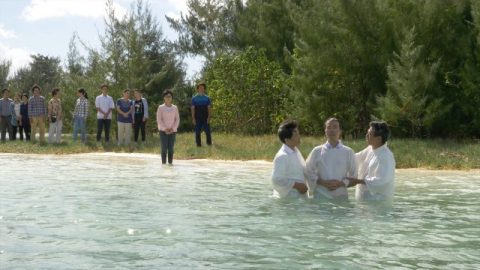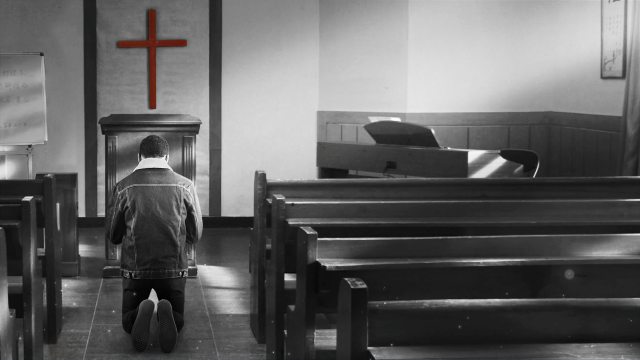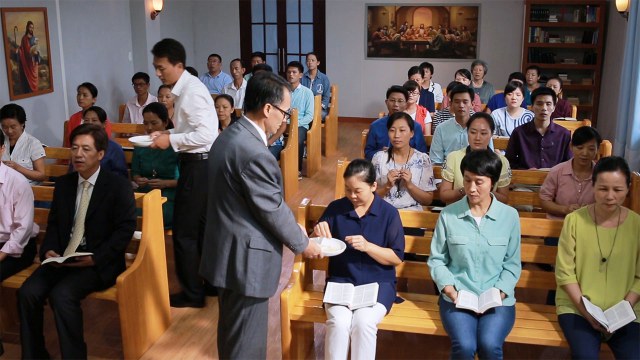Can People Enter Into the Heavenly Kingdom Through Baptism?
August 27
Dear Sister Wang:
Peace to you in the Lord! I’m very glad to receive your letter. In your letter you say: “I’ve always believed that we believers in the Lord have become an entirely new being because of having been baptized, so we are qualified to enter the heavenly kingdom when the Lord returns, for the Lord once said, ‘He that believes and is baptized shall be saved; but he that believes not shall be damned’ (Mark 16:16). But some brothers and sisters said: ‘Though we have been baptized and accepted the Lord’s salvation, we still live in sin and are unable to cast off the bondage of sin, so we must accept God’s work of judgment and purification in the last days for admission into the heavenly kingdom.’ I am very confused by this. Can people enter the heavenly kingdom through baptism?”

The question you have raised also puzzles many brothers and sisters in the Lord. And I was not an exception. It was not until recently when I attended a meeting—where the preacher, Sister Li, just happened to give a sermon about this aspect, which made me feel a special kind of brightness in my heart—that I came to understand the relationship between baptism and entry into the heavenly kingdom. Next I will share with you something that the sister fellowshiped that day and my gains. Sister Li said, “In Matthew 28:19-20, it says, ‘Go you therefore, and teach all nations, baptizing them in the name of the Father, and of the Son, and of the Holy Spirit: Teaching them to observe all things whatever I have commanded you: and, see, I am with you always, even to the end of the world. Amen.’ From the verses, we can see: Baptism is just a kind of ritual of accepting the work of the Lord Jesus and it represents our formally becoming a Christian and returning before the Lord. It also represents that we can enjoy the Lord’s care and protection as well as blessings, and that we have received the sin offering. But it doesn’t mean that we can enter into the heavenly kingdom. We have to admit the fact that we still cannot help but often commit sins though we have been pardoned for our sins. For example, we still lie and cheat in pursuit of reputation and status. When others harm our interests, we can still hate them, utterly incapable of practicing tolerance and patience as the Lord Jesus requires. When confronted with natural and manmade disasters, or trials and tribulations, we blame and betray God. When God’s work is not in accordance with our own conceptions, we deny, judge, and oppose God. These are facts for all to see. The Bible says, ‘Be you holy; for I am holy’ (1 Peter 1:16). And the Lord Jesus said, ‘Truly, truly, I say to you, Whoever commits sin is the servant of sin. And the servant stays not in the house for ever: but the Son stays ever’ (John 8:34-35). Therefore, because God is holy, only those who have freed themselves of sin and have been cleansed can enter the heavenly kingdom. Although we believers in the Lord have been baptized, we still have corrupt dispositions and can still sin and resist God. We have not yet been cleansed and changed and become an entirely new being. So how can we be qualified to enter into God’s kingdom?”
Then, the sister shared with us a passage of words: “A sinner such as you, who has just been redeemed, and has not been changed, or been perfected by God, can you be after God’s heart? For you, you who are still of your old self, it is true that you were saved by Jesus, and that you are not counted as a sinner because of the salvation of God, but this does not prove that you are not sinful, and are not impure. How can you be saintly if you have not been changed? Within, you are beset by impurity, selfish and mean, yet you still wish to descend with Jesus—you should be so lucky! You have missed a step in your belief in God: You have merely been redeemed, but you have not been changed. For you to be after God’s heart, God must personally do the work of changing and cleansing you; if you are only redeemed, you will be incapable of attaining sanctity. In this way you will be unqualified to share in the good blessings of God, for you have missed out a step in God’s work of managing man, which is the key step of changing and perfecting. You, a sinner who has just been redeemed, are therefore incapable of directly inheriting God’s inheritance.”
After listening to this passage and the sister’s fellowship, I understood: In the Age of Grace, the Lord Jesus only performed His redemption work. By believing in the Lord our sins are absolved and we are saved through our faith. But this salvation refers to no longer being convicted by law and sentenced to death. It doesn’t mean that we are completely holy, much less does it mean that we can enter into the kingdom of heaven. This is because though our belief in the Lord Jesus pardons our sins, our sinful nature is still deeply rooted within us, and we can still resist God, betray God, and consider God as an enemy. Evidently, if our corrupt satanic dispositions are not resolved, we will be unqualified to enter the kingdom of heaven.
The Lord Jesus said, “I have yet many things to say to you, but you cannot bear them now. However, when he, the Spirit of truth, is come, he will guide you into all truth: for he shall not speak of himself; but whatever he shall hear, that shall he speak: and he will show you things to come” (John 16:12-13). The Lord’s words are very clear. During the Age of Grace, the Lord Jesus never gave humans all the truths they needed in order to be saved. There are still many deeper and higher truths—the truths that will allow people to be freed from their corrupt satanic dispositions and achieve holiness. The Lord Jesus didn’t tell mankind these truths because at that time, the people lacked the necessary stature to bear them. Man must wait until the Lord Jesus returns to do His work in the last days. He will, through His work of judgment and chastisement, thoroughly cleanse us from our sinful nature and allow us to escape the bondage of sin and attain sanctity, and to be saved into the heavenly kingdom. This fulfills the prophecies in the Bible, “He that rejects me, and receives not my words, has one that judges him: the word that I have spoken, the same shall judge him in the last day” (John 12:48). “For the time is come that judgment must begin at the house of God” (1 Peter 4:17). So, our baptism does not mean that we have become an entirely new being. Only by accepting God’s work of judgment in the last days can we have the opportunity to achieve purification and enter into the heavenly kingdom.
Sister Wang, that is some of my understanding, and I hope you can benefit from it. If you have any new insights or enlightenment, please write to share them with me!
Yours sincerely,
Sister Lin





